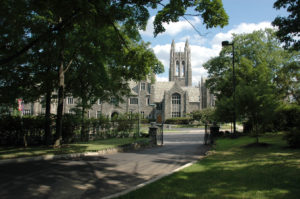February 2014
By Cathleen G. Spinelli, Ph.D.
 Q: Why did you participate in the IDA review process?
Q: Why did you participate in the IDA review process?
A: Our department had been diligently working to enhance our curricular content with the goal of ensuring that it is strongly research–based and will provide our pre-service teacher candidateswith the diagnostic and remedial knowledge and skills they need to be the most effective teachers for all students, especially those with diverse learning needs. When we were invited to be one of the university programs to be included in the first IDA review, we enthusiastically agreed to this rigorous evaluation process. Our faculty was delighted to learn that our program had been recognized for its innovation, rigor, and high quality content.
Q: How was the experience of preparing for and participating in the review?
A: We found the preparation and review participation to be a collaborative and very worthwhile experience. Reviewers kept us informed every step of the way. When sent the criteria for the evaluation, we examined our curriculum to be sure we were in compliance with IDA’s Knowledge and Practice Standards for Teachers of Reading. Each faculty member carefully reviewed course objectives to be sure there was a clear match with the IDA Knowledge and Practice Standards. The review team spent many hours carefully evaluating our materials; the team leader went on a field trip to AIM Academy, an exemplary private school modeled after the Lab School in Washington, D.C. where many of our graduate students (referred to as Teacher Scholars) complete their clinical experience. The review team made several very helpful suggestions that would enhance our program, and these recommendations were immediately implemented.
 Q: What does IDA Recognition mean to your university?
Q: What does IDA Recognition mean to your university?
A: Our university acknowledged the significance of IDA’s recognition, and this honor was instrumental in the university’s identification of our department as a department of excellence. We were especially pleased to be one of the few special education teacher preparation programs recognized for meeting the IDA Knowledge and Practice Standards for Teachers of Reading. Our department faculty understands the critical need for all pre-service teachers, particularly those who will work with pupils with diverse learning needs, to graduate with strong reading and writing competencies. The IDA Knowledge and Practice Standards provide an exemplary model for all teacher education programs. While we were pleased to be among the first nine university programs to receive IDA recognition, it is our hope that other teacher education programs will begin to embrace these high standards.
Q: Describe some of the innovative ideas you have implemented to give students a richer practicum experience.
A: Our Master’s of Science in Special Education has developed the Teacher Scholar Program, an innovative online program that offers graduate students the opportunity to follow one of several optional tracks that lead to teacher certifications and/or endorsements. These specialty options include Teaching English Language Learners, Teaching Students who are Deaf or Hard of Hearing, and the Autism Endorsement. Through our partnership with AIM Academy, we have been working with Barbara and Ed Wilson to develop graduate level courses that will enable our students to earn Wilson Reading Program Certification. The cornerstone of the Teacher Scholar Program is a one-year practicum in a designated school setting, working with highly qualified teachers who use research-based curricula and strategies. Students have the option of selecting a public charter school in an urban setting or a private school and may work with students individually, in small groups, or in large groups.
Q: How has your program leveraged outside partnerships to increase students’ learning experience?
A: Our special education graduate program, particularly the clinical experience within the Teacher Scholar program, has become known for graduating excellent diagnostic-remedial specialists. We are fortunate to have maintained our clinical experience at the AIM Academy since 2006. Our goal, strongly supported by the executive directors of AIM Academy, has been to branch out to form partnerships with a variety of local urban schools so that our Teacher Scholars can have an impact on vast numbers of urban students in a variety of settings. While our collaboration with AIM Academy has remained key, our Teacher Scholars now have an opportunity for clinical experiences in urban charter schools (e.g., the KIPP Schools in Philadelphia). One result of IDA’s recognition of our clinical program has been requests to partner with numerous public, private and parochial schools. We intentionally limit the clinical experiences we choose for our teachers to those schools with similar missions and administrative and teaching staff who are familiar with and committed to IDA’s Knowledge and Practice Standards. Our ultimate goal is to graduate large numbers of highly qualified diagnostic-remedial specialists who will have a major impact on the education of a sizeable population of urban students.
Cathleen Spinelli, Ph.D. has been the Department Chair and Graduate Director of the Department of Special Education. She was instrumental in the development of the Teacher Scholar Program and the Special Education Graduate Program. She is a certified psychologist, educational consultant, administrator and special education teacher and author of several textbooks published by Pearson, including Classroom Assessment for Special and General Education Students (3rd ed.).
Copyright © 2014 International Dyslexia Association (IDA). We encourage sharing of Examiner articles. If portions are cited, please make appropriate reference. Articles may not be reprinted for the purpose of resale. Permission to republish this article is available from info@interdys.org.

